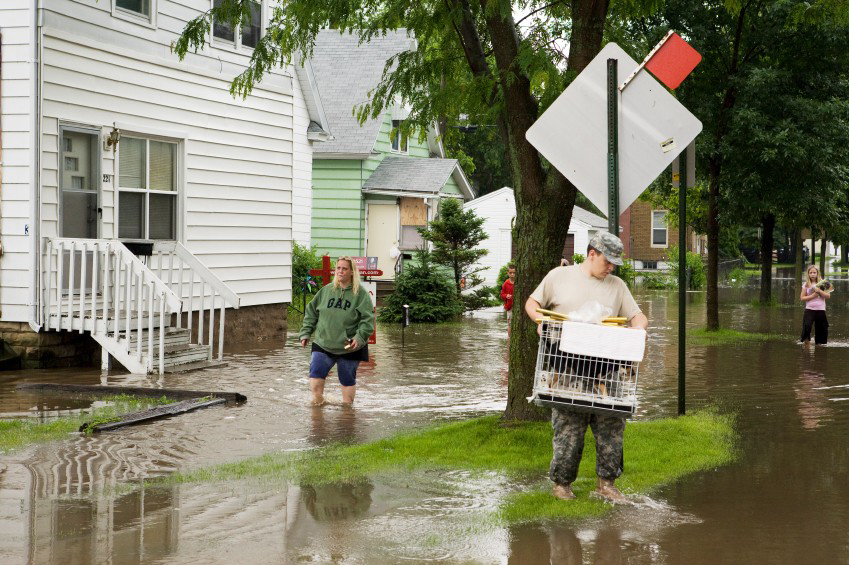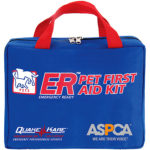Preparing Your Pets for Evacuation
 We never think it will happen to us, but the truth is a disaster can strike anywhere at any time. From hurricanes and fires, to gas leaks and terrorist threats, there are hundreds of reasons why you and your pets may need to evacuate your home. The important thing is to be prepared and to be certain your pets are, too. Here are some guidelines on getting your pets ready for evacuation.
We never think it will happen to us, but the truth is a disaster can strike anywhere at any time. From hurricanes and fires, to gas leaks and terrorist threats, there are hundreds of reasons why you and your pets may need to evacuate your home. The important thing is to be prepared and to be certain your pets are, too. Here are some guidelines on getting your pets ready for evacuation.
Microchip Your Pets: Your vet staff can do this, and it’s the best way to ensure you and your pet are reunited. Be sure to register the tag (or change ownership if you adopted a dog or cat from a rescue). If you move, be sure to update your pet’s microchip information. Always keep a recent photo of you and your pets on you. You never know when this information will be needed in case of separation. In addition to microchipping, your pets should always be wearing a collar with ID tags.
QR-coded tags are handy if you have a pet with a medical condition as you can store the information needed in one simple app. You decide how much of the information a stranger who finds your pet needs to know.
Know Where to Go: You should be certain you have a place to go in case of emergency. Search in advance for pet-friendly hotels in your area. In the event of long-term evacuation, you should have a plan in place with family or friends where you can take your pets. You might also want to make prior arrangements with a kennel (for dogs or cats), a ranch (for large animals) or an animal rescue (for exotics).
Know Your Emergency Veterinarian Hospitals: Even if you don’t think you’ll need a veterinarian, you should know where your nearest 24-hour hospital is for your pets. This is particularly important if you have large animals who are more likely to injure themselves due to the stress of evacuation.
Make a Plan: You should have several ways to get out of your home with your pets, know how you will gather them safely in a timely period and identify a “meet place” with other family members. Map out your area and know where the nearest 24-hr veterinarian clinic is located so you can ensure your pets receive prompt attention in case of emergency. Verify that your veterinarian, pet sitter, trainer or daycare facility has an emergency plan in place if anything happens while your pets are under their care.
Create a “Go Bag”: Every household should have a single backpack that you can “grab and go” on the way out the door. This is a perfect bag for quick evacuations (gas leak, police evacuation or other temporary threat).
This bag includes a three-day supply of whatever your pets need for longer-term evacuations. Larger animals can carry their own packs if you plan well. You should have a go-bag in place for each animal and teach them ahead of time how to carry a pack. Smaller pets may need you to do the carrying.
- Documentation: This includes an updated photo of you with your pet, microchip numbers, ID tag numbers and any emergency contact information in case anything happens to you.
- Water: You and your pet need water. Keep a three-day supply of water for you and your pets in your go-bag. Plan on keeping 1 to 3 ounces of water per pound of body weight for each animal, each day.
- Food: Keep at least three days of food for each pet in an airtight, waterproof container. Rotate these out on a monthly basis to ensure freshness. You may want to consider feeding your pets moist or canned food to assist in preventing dehydration. You can also consider purchasing premade emergency meal kits. (See resources below.)
- Medicine: Keep an extra week of medicine on hand for pets who are on prescription medication.
- Collar, Leash, ID Tags: Your pets should always be wearing a collar and ID tags, but it’s also a good idea to have an extra set stored in your “go bag.”
- Dishes: Be sure you have at least one dish for feeding and watering your pets.
Crate: Be sure you have a way of transporting your pet securely. Conduct training exercises on a regular basis so that pets know the crate is a safe place. The goal is to have the crate be their location to run if anything frightens them. There’s nothing worse than trying to find a cat that has hidden in fear during an emergency situation.
Sanitation: Be sure you have a way to clean up after your pet. For cats, this means a spare litterbox and litter (these are premade and easy to dispose of). For dogs, this means plastic doggy bags. Your sanitation bags should also include paper towels, a disinfectant and wipes.
Use the Buddy System: A buddy system can be incredibly beneficial in saving your pets lives. Particularly if you work away from the home or have large animals (like horses), larger dogs who may be considered threatening (shepherds, pit bulls, etc.), or exotics (reptiles, ferrets, birds, etc.). Proper handling of these animals often means the difference between life and death. Work out an agreement between three and four families to learn how to handle one another’s animals. That way, you have back up if you’re out of town and emergency strikes at home.
Emergency Resources 
- Center for Disease Control (CDC)
- Federal Emergency Management Agency (FEMA)
- Red Rover – Bringing animals from crisis to care
- American Red Cross
- American Veterinary Medical Association (AVMA)
Premade Meal Kits and Bottled Water for Pets:
- My Buddy Meals
- Barkem’s Portable pet meals
- Troff Water
- PrepareWise
- Costco – Emergency Dog Food Bucket
- QuakeKare
First Aid Kit for Pets
- Lixit First Aid Kit for Dogs and Pets
- Canine Friendly Pet First Aid Kit
- Alcott Emergency First Aid Kit
- ASPCA Emergency Ready Deluxe Pet First Aid Kit
About the Author: Stacy Mantle is the founder of PetsWeekly.com and the bestselling author of “Shepherd’s Moon.” Learn more great tips for living with animals by visiting PetsWeekly.com or get to know a little more about the author at www.StacyMantle.com





